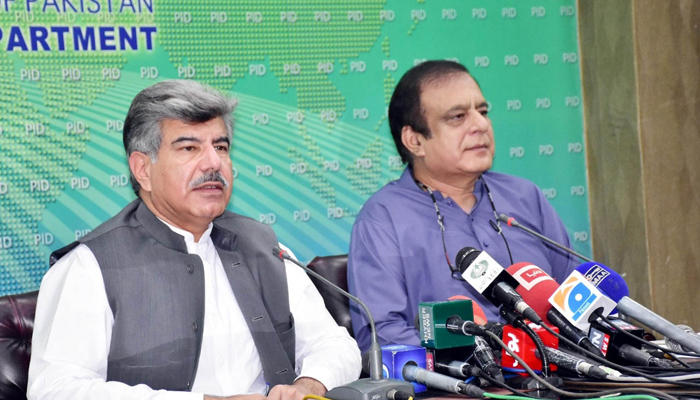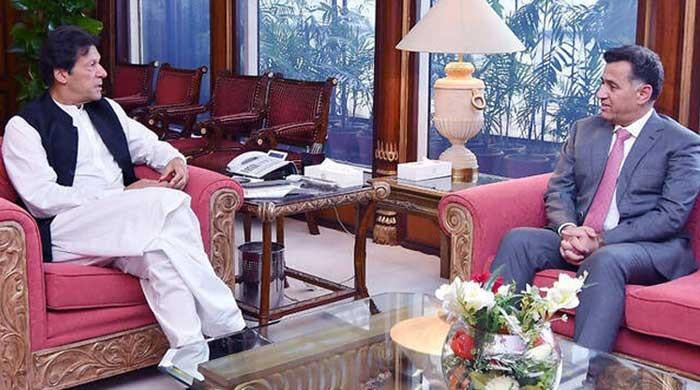PM Imran not one to yield to any pressure, says Shibli Faraz
There is "no chance" the opposition parties will come back to power, says the information minister
July 11, 2020

Information minister Shibli Faraz on Saturday said that Prime Minister Imran Khan is not one to yield to any sort of pressure (from his political opponents).
He was addressing a press conference in Islamabad alongside Chairman Prime Minister's Inspection Commission (PMIC) Ahmad Yar Hiraj.
His remarks follow a multi-conference organised by JUI-F chief Maulana Fazl-ur-Rehman and a meeting a day earlier between him and the top PPP leadership.
Both sides, in the meeting, agreed to work together "for the sake of national integrity and the country's survival". They also agreed to adopt a tough stance on the National Finance Commission (NFC) award and the 18th Amendment to the Constitution, with PPP chairman Bilawal Bhutto Zardari saying "Pakistan and Imran Khan cannot go hand in hand".
The NFC award announced this year has seen cuts in the share awarded to Sindh, whereas the 18th Amendment is being eyed for a review by the PTI. The Amendment grants provinces greater administrative and fiscal authority and was forged through a consensus during the PPP era.
Faraz, in his briefing to the media today, said that there is "no chance" the opposition parties will come back to power. "The Opposition has become so notorious that there really isn't any chance of them ever coming back."
"The Tehreek-i-Insaf government will not let them off the hook," he said, adding that the Opposition is "only afraid that if the government succeeds, they will all end up in jail".
Institutional reforms
The information minister said that the government has prioritised institutional reforms in line with PTI's manifesto.
"Unfortunately, the [state] institutions were deliberately paralysed," he remarked.
He said that in past government tenures, an item costing Rs100 otherwise was purchased at Rs150 and payment to vendors and suppliers was delayed.
Faraz said that government purchases are looked after by the office of the AGPR (Accountant General Pakistan Revenues). "Over Rs4 trillion in excess has been paid in the past 10 years for government procurement," he said.
He said that the past governments "were themselves engaged in corruption" so never did anything to root it out.
Faraz said that no government can bring about reforms in 20 months of governance but that transparency and stability of institutions remains the PTI government's top priority.
Corrupt practices in AGPR
Hiraj agreed that there is vast room for improvement within state institutions.
Speaking of AGPR in particular, he said that corruption within the institution had leaked over into other departments. He said major flaws exist within the government payments system.
The chief of the premier's inspection team said that on the prime minister's orders, the payments system was reviewed and recommendations regarding reforms in AGPR were sent to the prime minister.
He said that his commission has recommended SOPs which matched the premier's vision of a digital Pakistan.
The inspection chief said that a system update has been proposed so that the amounts of the cheques to be issued to various institutions should directly go to the accounts, like salaries of employees, so there are no chances of corruption.
Moreover, the AGPR should issue the list containing details of the requirements for clearance of bills on its website, so that no objection should be raised to delay the payments.
He said in AGPR postings of Grade 21 and 22 officers were being done without approval of the prime minister, which was also against the rules and would be stopped forthwith.
He said it was noticed by PMIC that government purchases were costing more than the similar procurements done by the private sector.
He said that this was called speed money or corruption as no bill was cleared from AGPR easily as objections were raised to get a gratification amount.
As the vendors had to bribe the AGPR staff, they showed an increase in prices of purchased items to adjust the amount, which proved an additional burden on the national exchequer.
He said FIA has also been directed to take action against the employees of AGPR who were involved in malpractices after evaluating the details of their assets.
He said that when he took charge, he realised that performance of almost all institutions was marred by malpractices.
He said that previous governments remained silent over the rampant malpractices and credit of taking this initiative goes to the PTI regime. He said under the reforms agenda of the government, the inspection commission has completed 24 inspections during 18 months.
He said reports of these inspections have been sent to the prime minister and action is being taken against the culprits involved in corruption and embezzlement.









